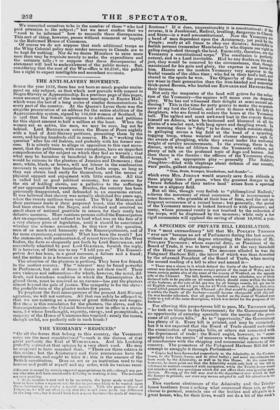THE ANTI-SLAVERY MOVEMENT.
Si sea the year 1832, there has not been so much popular excite- relent on any subject, as that which now prevails with respect to Negro Slavery or Apprenticeship. In a previous page of this paper, some account is given of the immense meetings at Exeter Hall ; which were the last of a long series of similar demonstrations in every part of the country. At the Queen's Levee there was the singular presentation of an address for the entire abolition of the Apprenticeship system, signed by 130,000 women of Scotland. It as said that the female signatures to addresses and petitions for this object amount to half a million at the least. When the women are so active, the men, we may be sure, lag not far behind. Lord BROUGHAM enters the House of Peers nightly with a load of Anti-Slavery petitions, presenting them by the score, and having hundreds still in reserve. He is "working this question" after his old fashion, and probably with his former suc- cess. It is utterly vain to allege in opposition to this vast move- ment, that the petitioners, with rare exceptions, have an imperfect comprehension of the subject on which they feel so warmly ; that what may be harmless or beneficial in Antigua or Montserrat, would be ruinous to the planters of Jamaica and Demerara ; that men, white, black, or brown, will not labour in the combination necessary to secure the hazardous West India crops, as long as they can obtain land easily for themselves, and the means of physical support and enjoyment with little exertion. All this is called bad or good political economy, but no excuse for the sin of holding slaves, nor a palliative to the sufferings of our oppressed fellow creatures. Besides, the country has been grievously disappointed, and defrauded to sit enormous extent. It was believed that slavery was actually abolished five years ago, when the twenty millions were voted. The Whig Ministers and their partisans made it their perpetual boast, that the shackles had been struck from the Negro, and claimed and received no small share of national gratitude in return for their costly but delusive measure. More cautious persons called the Emancipation Act an experiment, and refused to laud what was on the face of it a very clumsy piece of legislation, until it should be ascertained whether the scheme succeeded. In this view of the question, men of as much real humanity as the Emancipationists, and of far more experience,concurred. What has been the result ? Let the statements, well authenticated, of recent travellers in the West Indies, the facts so eloquently put forth by Lord BROUGHAM, and sorrowfully admitted by poor Lord GLENELG, furnish the reply. It is however, of little use to say " I told you so." The Emanci- pation Act has been, in a great measure, a failure and a fraud; and the nation is in a ferment on the subject.
The situation of the planters is perilous. They have few friends in the mother country. The "interest" may be found powerful in Parliament, but out of doors it flares not show itself. Their own violence and indiscretion—for which, however, the novel, dif- ficult, and hazardous condition in which the Emancipation Act placed them, must be received as an excuse—has put the planters almost beyond the pale of justice. The sympathy is for the slave : the probable ruin of the planter makes few pause. To prophesy the final consequences of the present Anti -Slavery agitation, we will not venture. All that can safely be affirmed is, that we are entering on a course of great difficulty and danger. But thee is this consolation for the planters, the slaves, and the Emancipationists—the Colonial Secretary now in office is a states- man, fer whose forethought, sagacity, energy, and promptitude, a majal ity of the House of Commons has vouched : surely the issues, though awful, are perfectly safe in such hands?


























 Previous page
Previous page